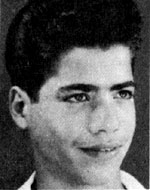Mordechai, Avraham
Son of Menashe and Hannah. Born in July 1949 in Baghdad, the capital of Iraq, the family immigrated to Israel in 1951. Avraham attended elementary school in a municipal institution for children in Hod Hasharon, where he completed his elementary studies, then studied for three years in high school In the youth village Meir Shfeya, he loved reading books, especially science books, while he was a member of the “Arazim” nucleus that was recruited to the Nahal Brigade and was designed to complete Kibbutz Gazit. Joined the nuclear group in the past year and soon found himself in the company and the kibbutz. He was drafted into the IDF in January 1967 and after the basic training period he was sent to a squad commander’s course. His spirit was always optimistic and, by nature, was the driving spirit of his company, and so all his friends loved him. He was comfortable and willing to help calm, carried wounded, arms and ammunition to his friends and helped all the tired and backward, but on the day he arrived at the course was taken to the front and he did not even start the course because he fell at the Jirdi post in Sinai. It was on the fourth day of the battles, on June 8, 1967, when he volunteered to take a special action tour. He was laid to rest at the military emergency cemetery in Bari and was later transferred to the eternal rest of the military cemetery in Kiryat Shaul. The commander of his squad, next to whom Avraham fell in battle, wrote to his bereaved parents in his condolence letter about the extraordinary courage with which their son had found himself facing superior forces even though they had lost their lives. His friends also spoke about his standing before suffering and effort. In his booklet “Yizre’el” of the Jezreel Regional Council his memory was raised. In addition, a page was devoted to his history in the booklet “53 of them” published by the Kibbutz Artzi in memory of its fallen comrades. His memory was included in the booklet “Brigade in the Six Day War” and in the book “Nachal Negev in the Campaign”.
